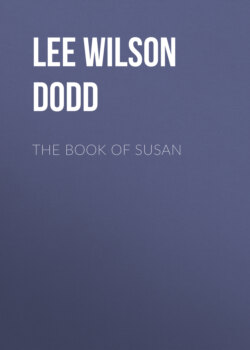Читать книгу The Book of Susan - Lee Wilson Dodd - Страница 13
На сайте Литреса книга снята с продажи.
II
ОглавлениеTable of Contents
But I anticipate. Two weeks before Mrs. Parrot's peroration, on the very evening of the day Maltby Phar had left me, Susan and I had had our first good talk together. My memorable shopping tour had not yet come off, and Susan, having pecked birdlike at a very light supper, was resting—semi-recumbent—in bed, clothed in a suit of canary-yellow pajamas, two sizes too big for her, which I was rather shaken to discover belonged to Nora, my quiet little Irish parlor maid. I had not supposed that Nora indulged in night gear filched from musical comedy. However, Nora had meant to be kind in a good cause; though canary yellow is emphatically a color for the flushed and buxom and should never be selected for peeny, anemic little girls. It did make Susan look middling ghastly, as if quarantined from all access to Hygeia, the goddess! Perhaps that is why, when I perched beside her on the edge of Gertrude's colonial four-poster, I felt an unaccustomed prickling sensation back of my eyes.
"How goes it, canary bird?" I asked, taking the thin, blue-threaded hand that lay nearest to me.
Susan's fingers at once curled trustfully to mine, and there came something very like a momentary glimmer of mischief into her dark eyes.
"If I was an honest-to-God canary, I could sing to you," said Susan. "I'd like to do something for you, Mr. Hunt. Something you'd like, I mean."
"Well, you can, dear. You can stop calling me 'Mr. Hunt'! My first name's pretty awkward, though. It's Ambrose."
For an instant Susan considered my first name, critically, then very slowly shook her head. "It's a nice name. It's too nice, isn't it—for every day?"
I laughed. "But it's all I have, Susan. What shall we do about it?"
Then Susan laughed, too; it was the first time I had heard her laugh. "I guess your mother was feeling kind of stuck up when she called you that!"
"Most mothers do feel kind of stuck up over their first babies, Susan."
She considered this, and nodded assent, "But it's silly of them, anyway," she announced. "There are so many babies all the time, everywhere. There's nothing new about babies, Ambo."
"Aha!" I exclaimed. "You knew from the first how to chasten my stuck-up name, didn't you? 'Ambo' is a delightful improvement."
"It's more like you," said Susan, tightening her fingers briefly on mine.
And presently she closed her eyes. When, after a long still interval, she opened them, they were cypress-shaded pools.
"Tell me what happened, Ambo."
"He's dead, Susan. Pearl's dead, too."
She closed her eyes again, and two big tears slipped out from between her lids, wetting her thick eyelashes and staining her bruised and her pallid cheek.
"He couldn't help it. He was made like that, inside. He was no damn good, Ambo. That's what he was always saying to Pearl—'You're no damn good.' She wasn't, either. And he wasn't, much. I guess it's better for him and Pearl to be dead."
This—and the two big tears—was her good-by to Bob, to Pearl, to the four-room house; her good-by to Birch Street. It shocked me at the time. I released her hand and stood up to light a cigarette—staring the while at Susan. Where had she found her precocious brains? And had she no heart? Had something of Bob's granitic harshness entered into this uncanny, this unnatural child? Should I live to regret my decision to care for her, to educate her? When I died, would she say—to whom?—"I guess it's better for him to be dead. Poor Ambo! He was no damn good."
But even as I shuddered, I smiled. For, after all, she was right; the child was right. She had merely uttered, truthfully, thoughts which a more conventional mind, more conventionally disciplined, would have known how to conceal—yes, to conceal even from itself. Genius was very like that.
"Susan!" I suddenly demanded. "Have you any relatives who will try to claim you?"
"Claim me?"
"Yes. Want to take care of you?"
"Mamma's sister-in-law lives in Hoboken," said Susan. "But she's a widow; and she's got seven already."
"Would you like to stay here with me?"
For all answer she flopped sidelong down from the pillows and hid her bruised face in the counterpane. Her slight, canary-clad shoulders were shaken with stifled weeping.
"That settles it!" I affirmed. "I'll see my lawyer in the morning, and he'll get the court to appoint me your guardian. Come now! If you cry about it, I'll think you don't want me for guardian. Do you?"
She turned a blubbered, wistful face toward me from the counterpane. Her eyes answered me. I leaned over, smoothed a pillow and slipped it beneath her tired head, then kissed her unbruised cheek and walked quietly back into my own room—where I rang for Mrs. Parrot.
When she arrived, "Mrs. Parrot," I suggested, "please make Susan comfortable for the night, will you? And I'll appreciate it if you treat her exactly as you would my own child."
It took Mrs. Parrot at least a minute to hit upon something she quite dared to leave with me.
"Very well, Mr. Hunt. Not having an own child, and not knowing—you can say that. Not that it's the same thing, though you do say it! But I'll make her comfortable—and time tells. In darker days, I hope you'll be able to say that poor, peeny little creature has done the same by you."
"Thank you, Mrs. Parrot. Good-night."
"A good night to you, Mr. Hunt," elaborated Mrs. Parrot, not without malice; "many of them, Mr. Hunt; many of them, I'm sure."
